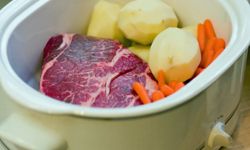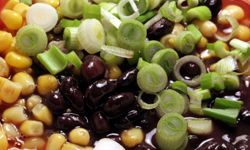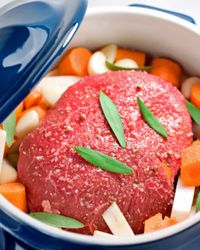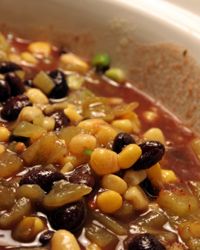“
 “Throw it all in and forget about it. See more pictures of comfort food.©iStockphoto.com/robynmac
“Throw it all in and forget about it. See more pictures of comfort food.©iStockphoto.com/robynmac
Wouldn’t it be great to avoid the last minute rush of getting food on the table at dinnertime? How can you perform this feat of modern wizardry? Why, with a slow cooker — also known as a Crock-Pot — of course. Instead of a jitterbug, do a slow dance in the kitchen with an ingenious method of cooking that has reinvented meal making for busy working folk. Don’t slave over a stove all day; let the slow cooker do the hard part for you. You don’t have to employ a soot-blackened pot on the hearth or use a sink full of dishes for this style of cooking. Modern electronic slow cookers handle temperature adjustments; moisture and time do the rest.
Contents
- Pick a Pot
- Make the Most of a Tough Situation
- Make More With Less
- Get the Timing Right
- Get Saucy
- Lose the Fat
- Spice it Up
- Go Vegan
- One Pot Meals
- Live Dangerously
10: Pick a Pot
The key to easy meals in hours is the pot. Slow cookers use time, low heat and moisture to tenderize and add flavor to food. Through the wonder of electricity, and sometimes electronics, meats, sauces and vegetables are cooked for long periods in a controlled environment. This is grandma’s cooking on your schedule. The results are fall off the bone tender dishes that transform tough cuts of meat into mouth watering entrees.
All slow cookers aren’t created equal, so invest in a unit that will make your life as easy as possible. Look for these features:
- Choose a slow cooker with electronic controls that will step the temperature down on a preset schedule. That way you can keep dishes warm if you’re late getting home.
- Pick a unit that has a dishwasher safe pot and lid.
- Look for slow cookers with locking lids that will take the hassle out of transporting your dishes.
- Invest in a cooker with touch pad controls. This feature is a little more expensive, but with no knobs, it’s easy to use and keep clean.
9: Make the Most of a Tough Situation
 “
“ “The tough meats need some love, too.©iStockphoto.com/cgering
“The tough meats need some love, too.©iStockphoto.com/cgering
One of the reasons people call home cooking comfort food is because it’s so satisfying to eat. What makes a slice of roast beef or bowl of stew so fulfilling is due, in part, to the connective tissue in tougher cuts of meat. Cuts, like chuck, have lots of connective tissue and loads of flavor. In fact, a good rule of thumb is that mature and less marbled meats have more flavor than the cuts you’re probably used to buying. Once you tenderize them with a few hours of low heat, and melt the connective tissue to a syrupy consistency that will add great texture to any sauce, you’ll have a meal fit for a Sunday at grandma’s house.
Taking advantage of these tougher cuts is a great way to save money on food. The advantage is all in the preparation. A piece of meat that you’d never consider throwing on the grill will make a great meal in a slow cooker.
8: Make More With Less
Beyond the benefits of buying less expensive cuts of meat, slow cooking will help you feed more for less. It’s no accident that dishes like soup and stew can feed a crowd with few ingredients. Hearty peasant food is filling, wholesome, and lets you stretch what you have because you’re adding water to the mix and letting the natural flavors of the ingredients permeate the liquid. That lowly potato, carrot or turnip won’t taste like a mere root vegetable when you’re done. It will be part of a blended meal that, instead of feeding four, will easily serve five or six because of the addition of less expensive ingredients, water and a few spices.
Slow cooking saves energy, too. You won’t be firing up the oven to cook, and that’s good for your wallet and the environment.
7: Get the Timing Right
 “
“ “The night before, cut your veggies, rinse your beans and get all your ingredients together.©iStockphoto.com/ca2hill
“The night before, cut your veggies, rinse your beans and get all your ingredients together.©iStockphoto.com/ca2hill
Slow cooking takes the guesswork out of meal preparation, but you still need to do some strategizing. Most slow cooked meals require from six to nine hours cooking time. The good news is that once everything’s in the pot, you don’t have to stir or add any more water. The bad news is that you do have to get everything into the pot before you head out in the morning. You can prep the ingredients the night before and keep them in the fridge until you’re ready to load up the cooker. Use something other than the slow cooker insert to store your ingredients in, though. Chilling the insert may cause your ingredients to take too long to come to temperature when you do fire up the pot, allowing bacteria to form.
Keeping track of the time may be important, too. If you have an electronic slow cooker, it will automatically step the temperature down to warm for you, otherwise you’ll have to keep track of how long your meal has been cooking in order to avoid burning dinner.
6: Get Saucy
Slow cooking produces flavorful sauces. Water used in the cooking process blends with meat and vegetable juices to form a rich and complex broth. This is one reason that slow cooked meals can be so flexible. Time, moisture and wholesome ingredients often result in spectacular blended flavors.
You can opt for using convenient condensed or packaged soup mixes as flavoring agents or branch out. Try using wine, beer, liquor, soy sauce or tomato products in your slow cooker recipes. Add an onion, some celery, carrots, turnips and a couple of garlic cloves. Suddenly you have ambrosia in the making. The alchemy that results in great slow cooker sauces isn’t courtesy of any single ingredient. The magic of slow cooking is that the recipe ingredients have time to incorporate, making beautiful, finished dishes.
5: Lose the Fat
 “
“ “Look for meat with as little marbling as possible to avoid unnecessary fat.©iStockphoto.com/kcline
“Look for meat with as little marbling as possible to avoid unnecessary fat.©iStockphoto.com/kcline
Slow cooking is naturally low in fat. Aside from some preliminary sautéing, most slow cooking uses very little oil. Typically recipes call for meats that have been trimmed of fat and skin; the meats themselves usually have less marbling than more popular, expensive cuts too. Slow cooker meals cook in their juices, not in fat, which makes them naturally lower in calories and rich in flavor.
Consider this too, especially if someone in your family is on a diet. Where fat often equals flavor, it comes at a high price. Slow cooked meals use substantially less fat than many fried and even baked dishes, but they’re still bursting with flavor, vitamins and minerals. If you thought you had to give up flavor to lose weight, guess again.
4: Spice it Up
When you’re exploring the world of slow cooking, don’t forget the herbs and spices. One of the things you’ll begin to notice when you look at a few slow recipes is that slow cooking uses lots of herbs and spices. From commonplace spices you know and love, like parsley, to curries and other exotic fare you’ve never heard of before.
Although it can seem daunting, don’t omit that cumin or cardamom. Blending flavors is what makes this culinary discipline so exciting and unique. Flavors can morph into something unforgettable. As a matter of fact, why not plan on adding a few extra spices to your repertoire? Remember, no single spice will take center stage. After all, some popular chili recipes call for cinnamon and allspice. Really.
3: Go Vegan
 “
“ “You don’t need meat to make a meal!©iStockphoto.com/ca2hill
“You don’t need meat to make a meal!©iStockphoto.com/ca2hill
Vegetables can be delicious when cooked in a slow cooker. Throw in a little flavored oil, some green beans, sugar and vinegar, give it a few hours and you’ll have a sweet and sour dish the whole family will love. How about sweet potatoes, brown sugar and peaches? Good for you doesn’t have to mean bland. The extra cooking time at low heat will give your veggies time to mellow while retaining their vitamins, minerals, color and texture.
What better way to prepare your vegetables than with slow, even heat that will give you a nutritious meal that looks good and tastes great?
2. One Pot Meals
If you’ve ever slaved over a dinner only to have your family pick it apart, pass on all the nutritional stuff, eat the greasy main course and then move on to dessert, you’ll love one pot meals. Everything cooks together, making it easier to get young children to sample new things. You can count on a lot of flavor transfer, too, so those little mushrooms taste meaty, and that slice of zucchini is wearing a gravy overcoat. Once you train your family to expect meals in a pot, serving all the food groups becomes a much more democratic process.
Cleanup and stowing leftovers is super easy, too.
1: Live Dangerously
 “
“ “Look beyond salt and pepper when dreaming up your next slow cooker concoction.©iStockphoto.com/sumnersgraphicsinc
“Look beyond salt and pepper when dreaming up your next slow cooker concoction.©iStockphoto.com/sumnersgraphicsinc
In addition to a few exotic spices, slow cooker recipes use some unusual ingredients, like jams, nuts and seeds. You may be used to pouring a little Sherry on your stir-fry, but kicking it up a notch to include a quarter cup of pecans in your pork dishes or a dollop of chutney in your meat loaf may be outside of your comfort zone. Before you pass on the dried raisins or pickled ginger, remember that the strong flavor you’re worried about probably won’t impact the recipe the way you expect. Why not walk on the wild side and give it a try? You might end up discovering your signature dish.
Lots More Information
Related HowStuffWorks Articles
- How to Distinguish Wine Notes
- Top 5 Beer-making Tips
- Top 5 Ways to Improve Your Palate
- How Southern Food Works
- How Restaurant Markups Work
- How Steak Works
Sources
- ConsumerReports.org. "Slow Cookers: Convenience Is Key." 11/08. 7/11/09.http://www.consumerreports.org/cro/appliances/kitchen-appliances/slow-cookers/slow-cookers/overview/slow-cookers-ov.htm
- ConsumerSearch.com. "Slow Cooker Review." Undated. 7/11/09.http://www.consumersearch.com/slow-cookers/review
- Crock-Pot.com. "Cooking Tips. Undated. 7/12/09.http://www.crock-pot.com/Hints.aspx?id=ct&fgid=44
- Editors of Easy Home Cooking Magazine. "Slow Cooker Questions." Undated. 1/30/09.https://recipes.howstuffworks.com/slow-cooker-questions.htm
- How To Cook Gourmet. "Cooking Meats." Undated. 1/1/09.http://www.how-to-cook-gourmet.com/cookingmeats.html
- Neill, Marilyn. "Crock-pot Cooking." Golden Press. 1975
- Ponikowski, Marissa. "The Art of Slow Cookery. " Undated. 7/12/09http://www.foodtv.ca/content/entertaining/ContentDetail.aspx?ContentId=2395&Category=Entertaining
- TheFuntimeGuide.com "Top 10 Reasons to Use a Crock-pot. 3/09. 7/11/09.http://food.thefuntimesguide.com/2009/03/crock-pot_slow_cooker.php


